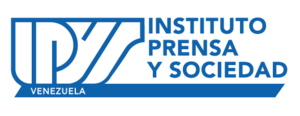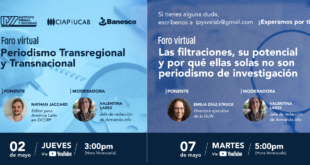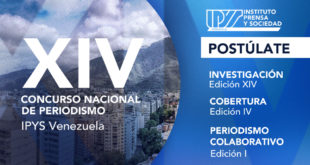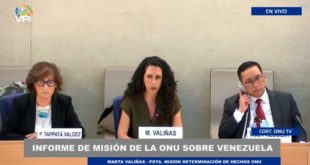El 02 de enero de 2013, Ernesto Villegas, ministro de Comunicación e Información, dependencia del poder ejecutivo, envió una carta a Globovisión, planta televisiva privada en la que calificó de “inaceptable” y “desatinado” que este canal se refería al Vicepresidente de la República, Nicolás Maduro, “como presidente encargado”.
Así lo manifestó Villegas en la comunicación dirigida a la vicepresidenta ejecutiva de la televisora, María Fernanda Flores, en la que expresaba: “me permito recordarle que el único Presidente en ejercicio de la República Bolivariana de Venezuela es Hugo Chávez, ganador la elección del 7 de octubre, cuando fue reelecto con 8.191.132 votos para el período 2013-2019. El hecho de que por razones médicas el Presidente de la República esté de permiso constitucional, aprobado en forma unánime por la Asamblea Nacional, y haya delegado algunas de sus atribuciones en el Vicepresidente, no autoriza a desconocerlo en la titularidad y ejercicio de su cargo. La invito a enviar una nueva comunicación con la corrección pertinente para poder entrar a considerar el planteamiento de su representada” ( http://www.minci.gob.ve/2013/01/03/carta-a-globovision-el-unico-presidente-de-venezuela-se-llama-hugo-chavez/).
Ricardo Antela, consultor jurídico de Globovisión, informó a Ipys Venezuela, que el 1° de enero de 2013, el ministro Villegas llamó, vía telefónica, a la planta televisiva e informó que ese día en la noche, la Nueva Televisora del Sur (Telesur) -cadena de noticias con proyección latinoamericana con sede en Caracas, y que ha contado con el auspicio del gobierno venezolano- transmitiría una entrevista con el vicepresidente Nicolás Maduro desde la Habana, para ofrecer detalles sobre la salud de Hugo Chávez, y que él consideraba que era una información de interés público a la que se le debía dar difusión por parte de este medio. Representantes del canal le manifestaron a Villegas que Globovisión no tenía ningún inconveniente de atender esta solitud, pero que necesitaban una autorización para realizar esta petición, debido a que existe una prohibición, desde hace varios años, de Telesur para que Globovisión utilice la difusión de sus contenidos. El ministro les dijo que él no tenía conocimiento de esta prohibición y que autorizaba al canal a retransmitir la señal de Telesur.
Las limitaciones para retrasmitir la señal de otro medio de comunicación se sustenta en el artículo 14 de la Ley de Responsabilidad Social en Radio, Televisión y Medios Electrónicos, el cual establece: “Los servicios de radio o televisión, podrán retrasmitir mensajes de otros prestadores de servicios de radio o televisión, previa autorización de éstos, informando de ello a la Comisión Nacional de Telecomunicaciones”.
Atendiendo a este llamado, Globovisión retransmitió la entrevista de Maduro, el 1 de enero desde la Habana, desde la señal de Telesur. Al día siguiente, para dejar por escrito lo conversado con Villegas, la consultoría jurídica de Globovisión envió una carta, privada con interés administrativo, al despacho del ministro, con el asunto principal de solicitar que enviara al canal, por escrito, la revocación de la prohibición que había establecido Telesur para que Globovisión utilizara su señal, y que este canal realizaría lo mismo, para autorizar a Telesur a utilizar sus contenidos audiovisuales. Además, explicaban en el contexto en el que se había utilizando la señal de Telesur, con la descripción coyuntural que la retransmisión obedecía a una entrevista realizada Nicolás Maduro, quien es vicepresidente de la República, y quedaba como presidente encargo.
Antela informó que Villegas, en su comunicación, se refirió al “aspecto tangencial” sobre Nicolás Maduro, pero no dio respuesta al asunto principal, referente a la revocatoria de la prohibición establecida por Telesur. Resaltó, además, que ésta era un asunto administrativo, que había sido tratado en una comunicación privada. Asimismo, el canal consideró amenazante las palabras con las que se dirigió el ministro de Comunicación al canal, en la carta que hizo pública.
Este hecho evidencia un uso abusivo del poder estatal, por declaraciones agraviantes de un funcionario público contra un medio de comunicación. Asimismo, refleja la utilización de normas vigentes que dificultan la libertad de expresión.
Etiqueta: uso abusivo del poder estatal, normas que dificultan la libertad de expresión
________________________________________________________________
Lea la versión en inglés
The Minister of Communications publicly admonished a private channel for allegedly attempting to “disown the entitlement” of the president of the republic
On January 2nd, 2013, Ernesto Villegas, the minister of communications and information, a dependency of the executive power, sent a letter to Globovisión, a private TV station in which he qualified this channel´s reference to the vice-president of the republic, Nicolás Maduro “as the president in charge” as “unacceptable” and “mistaken”.
This was stated by Villegas in a communiqué addressed to the executive vice-president of said TV station, María Fernanda Flores, in which he expressed: “Allow me to remind you that the only president in exercise of the Bolivarian republic of Venezuela is Hugo Chávez, who won the elections on October 7 and was reelected with 8,191,132 votes for the 2013-2019 term. It is unacceptable for a company who has a license on a TV signal, dedicated to the commercial exploitation of a portion of the radio-electric spectrum which is the property of the Venezuelan people, to issue a formal communiqué that is so mistaken. The fact that, due to medical reasons the president of the republic is on a constitutional leave of absence, unanimously approved by the national assembly and has had to delegate some of his powers in the vice-president does not give you authorization to disown his entitlement to, and exercise of, his position” ( http://www.minci.gob.ve/2013/01/03/carta-a-globovision-el-unico-presidente-de-venezuela-se-llama-hugo-chavez/).
Ricardo Antela, Globovisión´s legal consultant, reported to Ipys Venezuela that on January 1st, 2013, minister Villegas called the TV station over the phone and informed that that day -during the night- the Nueva Televisora del Sur (Telesur) – a TV news chain aired in Latin America, with headquarters in Caracas, and sponsored by the Venezuelan government- would air an interview with vice-president Nicolás Maduro from Havana, to offer details on the health of Hugo Chávez, and that he considered that it was information of public interest that should be aired through that channel. Representatives of the TV channel stated to Villegas that Globovisión had no problem in attending to this request, but that they needed an authorization to meet this petition, in light of a longstanding ban by Telesur for Globovisión to broadcast its content. The minister told them that he had no knowledge of this ban and authorized the TV channel to rebroadcast Telesur´s signal.
The limitations to rebroadcast the signal from another communication media was based on article 14 of the law of the social responsibility of radio, television and electronic media, which sets forth that “Radio or television services may retransmit messages from other radio or television service providers, with the prior authorization thereof, by informing of this to the National Telecommunications Commission”.
In answer to this call, Globovisión retransmitted the interview with Maduro on January 1st from Havana, through Telesur´s signal. The following day, in order to have a written record of the conversation with Villegas, Globovisión sent a private administrative letter to the minister´s dispatch, the main purpose of which was to request that he send to the channel in writing the revoked ban set by Telesur on Globovisión using its signal and vice versa, to authorize Telesur to use its audiovisual content. The context under which Telesur´s signal had been used was also explained, including the description of the exact circumstances under which the rebroadcast was due to an interview with Nicolás Maduro, who is the vice-president of the republic, and had been left as the president in charge.
Antela informed that Villegas, in his communiqué, referred to the “tangential aspect” regarding Nicolás Maduro, but gave no response to the core issue regarding the revoked ban established by Telesur. It was also highlighted that this was an administrative affair, which had been dealt with in a private communication. The TV channel also considered the words with which the communications minister addressed the channel in the letter he made public as threatening.
This fact evidences an abusive use of the state´s power, through extenuating declarations by a public official against a communications. It also reflects the use of norms in force that hinder freedom of expression.
label: abusive use of the state´s power, norms that hinder freedom of expression
 IPYS Instituto Prensa y Sociedad Venezuela
IPYS Instituto Prensa y Sociedad Venezuela



